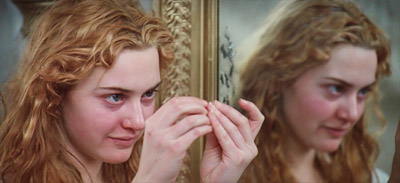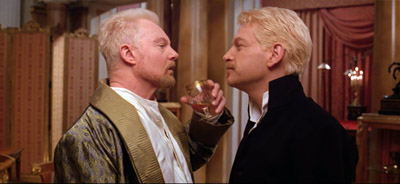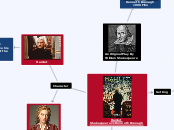
Hamlet
Shakespeare vs Kenneth Branagh
Character

Hamlet
“I’ll have these players / Play something like the murder of my father/ Be mine uncle. I’ll observe his looks. / I’ll tent him to the quick. If he do blench, /I know my course” (2.2.573-577).
During one of his many soliloquys, Hamlet informs the audience of his plan to reveal the true cause of his father’s death through the play that will be performed that night. Upon seeing the players arrival, Hamlet pulls one of the individuals aside and requests him to add a few more lines to their performance in order to re-enact King Hamlet’s murder. By paying close attention to how his uncle reacts to the scenes being acted before him, he hopes to see if the story narrated to him by the apparition was true or not. In the movie displayed by Kenneth Branagh successfully captures and portrays Hamlet’s mysterious and deceptive nature. Through the duration of the movie, Hamlet keeps his thoughts and plans a secret creating a mysterious environment leaving the audience in anticipation on what he might do next and if it will be carried out effectively. Likewise, in the novel, the character of Hamlet also creates an environment filled with suspense and mystery, leaving the audience at the edge of their seats. Moreover, in the movie Hamlet also is portrayed to be deceptive effectively with the variety of facial expressions that are used. Thus resulting in Branagh to display the image of Hamlet in a way that can relate closely to whom is being portrayed in the written version.

Ophelia
“Dear maid, kind sister, sweet Ophelia!/ O heavens, is’t possible a young maid’s wits / Should be as mortal as an old man’s life?” (4.5.158-161).
Throughout the play, Ophelia is mainly portrayed to be a woman who is tough at heart when it comes to hearing bad news yet soft when it comes to the thought of love and the people close to her heart. However, Ophelia’s character takes a drastic change upon hearing the news of her father, Polonius’s, death. Instead of reacting the way many may have anticipated, Ophelia became a woman that was nowhere near who she was making her completely insane. In the film, the director portrays this drastic change in Ophelia’s character through her facial expressions and body language. She put on a hallow smile on her face making it seem as if she were living in own little world, and carried herself around a room so carelessly, causing it to appear as if she had no control over her body. Moreover, as seen in the dialogue above, her acting this way made her brother realize that with the loss of his father, he had practically lost his sister as well. With the body movements shown by Ophelia in the film it allowed the viewer to comprehend the she has gone insane. Thus, with the assist of the body language in the film, Branagh does an astonishing job in portraying Ophelia parallel to the original play.

Ophelia in her state of insanity
Character

Revenge
“Revenge his foul and most unnatural murder/ […]/Haste me to know’t, that I with wings as swift/ As meditation or the thoughts of love,/ May I sweep my revenge” (1.5.25-31).
The theme that can be recognized throughout Shakespeare’s play Hamlet is the reoccurring theme of revenge. In the beginning of the play, Hamlet is introduced to the ghost of his father who narrates the true cause of his death to Hamlet. Upon hearing that his father was murdered by his uncle, Hamlet begins to plan out his avenge on Claudius. Similarly, in the movie this theme is displayed when Hamlet is lead into the forest by the ghost and tells him about his father’s death resulting in him feel a lot of anger towards Claudius for committing such a sin. Moreover, having the apparition of his father encourage him only made Hamlet, want to get revenge faster. The rage and hatred that can be recognized in Hamlet’s eyes and body language as he screams at the ones above assist in allowing the audience to understand the power and determination Hamlet carries towards getting his revenge.

The Ghost of King Hamlet

Deception
“You could, for a need, study a speech of a dozen or sixteen lines which I would set down and insert in ‘t, could you not?” (2.2.517-519).
The theme of deception is portrayed throughout the play during the time in which Hamlet puts on performance that re-enacts the death of his father in order to confirm if what the ghost had said was true or just a lie. In the film, to be specific, this moment of deception occurs just before the performance as Hamlet displays himself to be friendly towards Claudius, making Claudius believe that Hamlet is actually taking a liking in him when in reality Hamlet is putting up a fake personality for his plan. After asking the players to change their script up as seen in the dialogue above, Hamlet puts his plan into motion by portraying himself to be exactly as Claudius wants him to be. Moreover, by being the man his uncle hopes him to be, Hamlet is giving Claudius a chance to feel superior right before he brings his power down with the act he includes in the play of the night. Along with the many other moments in which Hamlet portrays himself to be someone he is not through his expressive body language, the theme of deception is carried out exceptionally by the director throughout the film in relation to the original play.

The talk with the players
Setting

Intense
“The king rises. / What, frighted with false fire?” (3.2.248-249)
During the famous preformance that takes place, through which Hamlet hopes to get a reaction out of Claudius as he asks the players to re-enact his father’s murder, an intense environment is created between the two. With the various comments that Hamlet makes throughout the play, the audience can see Claudius getting extremely agitated while finding a way to counter all of Hamlet’s thoughts. In the film, the director creates this environment through the various changes in Hamlet’s tones as well both Claudius’s and Hamlet’s body language. As the viewers see them both begin to appear tense and hard faced, along with their voices becoming louder and powerful, the feeling of intense hatred sets between the two. Moreover, the use of dramatic music used during many key scenes such as the one mentioned above, the director is able to portray the anger between the two characters. Thus, with the assist of tone, body language, and music, the director Kenneth Branagh shows exceptional display of the setting Shakespeare creates through his original play.

Claudius's intense glare upon Hamlet

An Original Play By
William Shakespeare
Kenneth Branagh
1996 Film
Two captivating variations
of the play Hamlet
